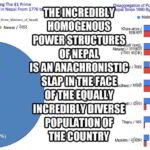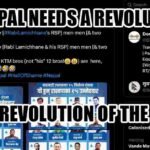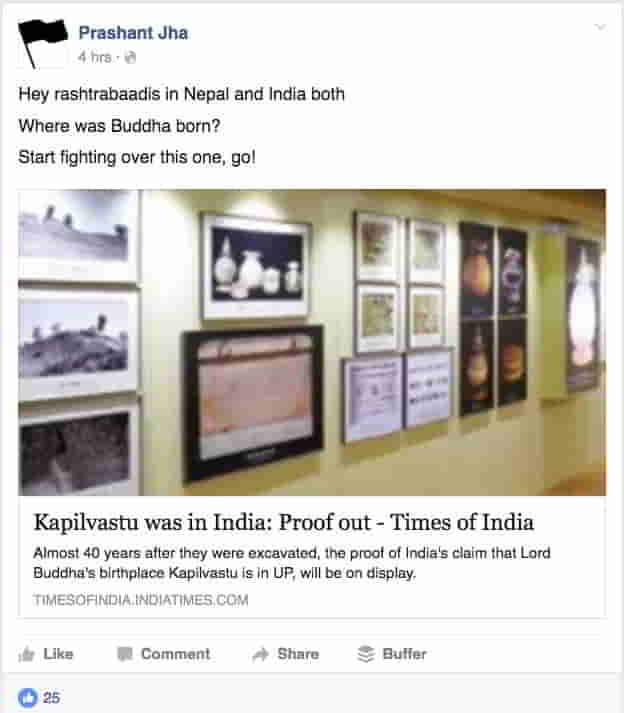
The above post, yesterday morning, gave me a laugh, reminding me yet again of the ridiculousness of the “debate” over the birthplace of Buddha.
The first time I became aware of the “drive” of the Nepalese to “prove” or “reaffirm” that Buddha — Gautam Buddha, the historical Buddha — was born in Nepal was way back in 2013. At the time, I was living in Qatar but came home every single break. One of those times, visiting Patan Durbar Square, I came across this.
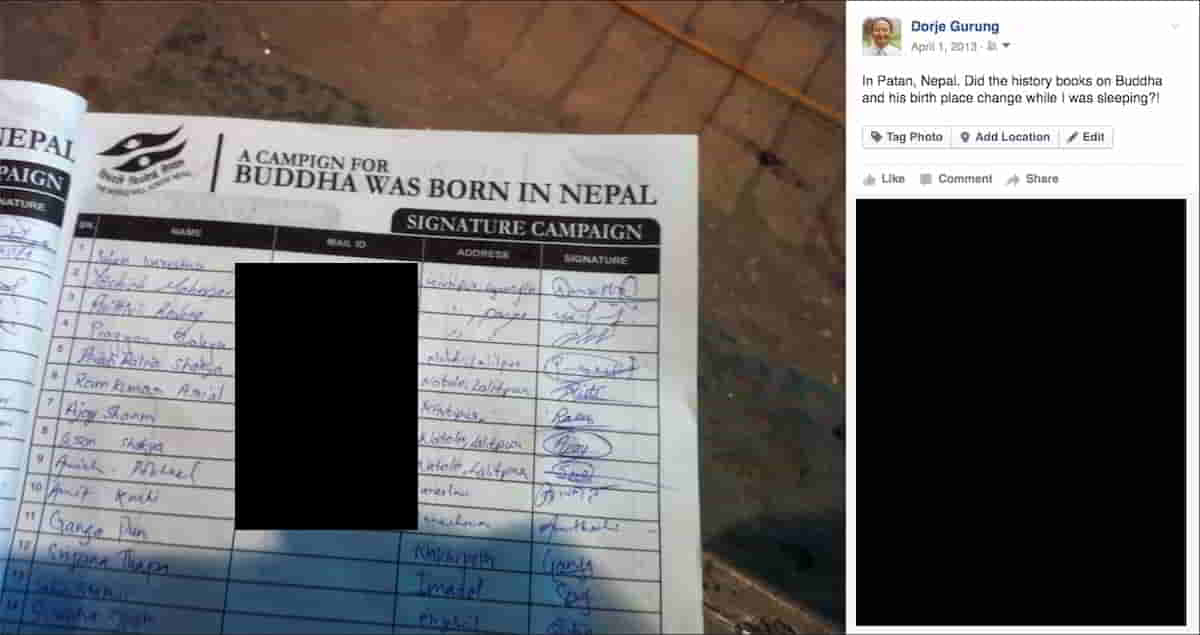
Since then, I have noticed T-shirts and flags with that declaration. I have seen many Facebook campaigns as well.
As matter of fact, a search for “Buddha was born in Nepal” on the social media yielded roughly 300 hits!
For many this appears to be an issue of national pride, hence Prashant’s call on the rashtrabaadis (nationalists) to fight over it, partly in jest I am sure.
I have no issue with people taking pride in Buddha’s birth place being their own country.
I confess I myself have, in the past, corrected people who thought Buddha was born elsewhere. After all, the history I had learned in Nepal had told me so. (Of course, Nepalese history is filled with holes and a lot of it was propaganda. For instance, it excluded most of the people of the country, but that’s another story all together.)
I also have no issue with people taking pride in their (birth) country either.
(Though, I have yet to hear a convincing argument for it.)
Regardless, the way my countrymen think about and treat the Madhesis, those living along the southern plains — Buddha’s birth place — I find a little lacking and telling.
The recent maligning of the Madhesis on social media and elsewhere by other Nepalese, was precipitated by their protests against the constitution, made worse by the “unofficial” Indian economic embargo.
Many in Kathmandu vociferously decried their loss of some of their conveniences and the disruptions to their cushy and comfortable lives. Furthermore, they were quick to blame the Madhesis, for the loss of, according to them, their rights — most of which were really privileges they had enjoyed throughout the modern history of the country mostly at the expense of the rest of the people (such as those in Madhes and elsewhere, including Kathmandu). Few appeared to blame the ineffective government, the political leaders and the corrupt political and economic power structure of Kathmandu.
The nationalists and ultra-nationalists were quick to even disown the Madhesis saying that they are really Indians and NOT Nepalese. Much was made of the heritage of the Madhesis — for their cultural and ethnic ties to their neighbors across the border. The mainstream media joined the bandwagon either failing to provide adequate and fair coverage or, when providing coverage, publishing unbalanced reports.
Vilification of Madhesis on social media alone is quite appalling. For instance, on Facebook there are at least 116 profiles and pages about Dhotis. (Click here to view one of the two lists and here for the other.) Dhoti in Nepali denotes the attire worn by men of Indian heritage. It is also an ethnic slur used to refer to people of Indian heritage, i.e. both people of India and people indigenous to the southern plains of Nepal.
You can argue that all the profiles and pages are NOT about Nepalese Dhotis (and therefore not discriminatory against fellow citizens) and that some are about Indian Dhotis (and therefore nationalistic). I, however, am not going there.
But…of course…”Buddha was born in Nepal.”
The irony, not lost on me, I pointed it out in a Facebook post way back in November.
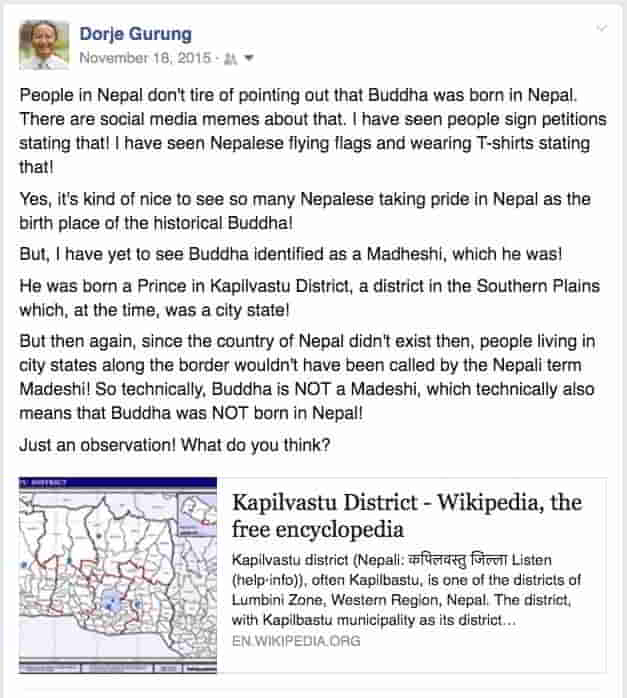
But of late, a neighbor we have a longstanding love-hate relationship with — as happens between all “good neighborly” countries in every continent — India has become “Enemy Number 1”!
The country (some argue as being only partly) responsible for the very costly, recent economic embargo; the country many in Kathmandu see as meddling in our internal affairs by attempting to influence amendments to the constitution promulgated six months ago; the country, which, following our PM Oli’s very recent visit, reduced their development aid by 40% — has now claimed that Kapilvastu, the birthplace of Buddha, is in India!
Will that mean the rebirth of the #BackOffIndia campaign?! 🙂
Jokes aside, by all means take pride in having been born in the same country/region as the Buddha because, really, as far as I can tell, that’s what “Buddha was born in Nepal” campaign really is.
But, as you may already have gathered, where Buddha was born, i.e. the nationality of Buddha as it were (!), is of little to no significance whatsoever.
(All this debate over where he was born is probably making Buddha turn in his grave…figuratively speaking of course…I mean…you know what I mean!)
What should matter first is Buddha was born and second is his Dharma, his teachings.
How about we put his teachings to practice and become as close to Buddha, the Enlightened One, in words and deeds as we are to his birth place?!
Nepal: Naam ma chai Buddha ko janma sthal, kaam ma chai?
— Dorje Gurung (@Dorje_sDooing) February 9, 2016
(“Nepal: In name the birth place of Buddha, in deed?”)
One of the most important of his teachings or doctrines, for example, is the principle of ahimsa (“not to harm/non-violence/compassion”).
How about we practice ahimsa by viewing and treating everyone — from the Bhotes in the mountains to Tamangs, Bahuns, Gurungs, Chhettris, Dalits etc. in the hills to the Dhotis (Tharus, Dums etc.) in the Southern Plains — as being in the same boat and therefore Nepalese?!
And, how about we work to provide opportunities for personal, social, economic and political advancement of those historically marginalized, such as the Madhesis, the Tamangs and women etc.? Because, if we are all Nepalese, and equal, they deserve as much opportunities as the rest.
Buddha also advocated against the caste system. How about working to end that archaic social system and paving the way for a just society in the country?
Doing and living as Buddha would have wanted us to will probably make HIM prouder than anything else we do or say about him (such as where he was born)!
And THAT would be something EVERYONE in Nepal can take pride in, wouldn’t it?!
* * * * * * * *
References:
Racist Social Media Pages/Groups on Facebook.
Racist Anti-Madheshi Facebook Groups.
Nepal blockade: Six ways it affects the country.
Budget 2016: Days after Oli visit, 40% cut in aid to Nepal. “In the Union Budget presented Monday, the Centre allocated Rs 300 crore for aid to Nepal for 2016-17, a massive decline from last year’s allocation of Rs 420 crore.”
Kapilvastu was in India: Proof out. Read the comments as well.
The country is yours. The Op-ed by Deepak Thapa about the plight of Tamangs and the arrogance and bigotry of even current high-caste government officials.
The Tamang Epicentre. Details of the different reasons Tamangs disproportionately suffered from the earthquake, one of which is the historical neglect of the people by Kathmandu and its elite.
Additional References:
State of crisis. Pramod Mishra’s op-ed on how loss of credibility of the ruling class is the biggest crisis Nepal is facing right now.

